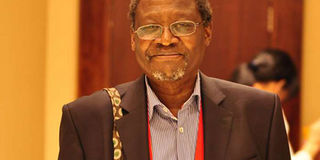Thandika: Death robs Africa of a brilliant mind

Professor Thandika Mkandawire. He was the founding chair of African Development and professor of African Development at the London School of Economics. PHOTO | COURTESY
What you need to know:
- Few African scholars have demonstrated as much fidelity as he did to the principles that motivated the struggle for African freedom from colonialism.
- He received honorary doctorates from the universities of Fort Hare in South Africa, Helsinki, Ghana at Legon, and York in Canada.
With the death of Professor Thandika Mkandawire of Malawi on March 27 in Stockholm, Africa has lost its premier thinker on economic development and national governance issues, just when his thinking would have been sought on the imminent disaster that now faces the continent from Covid-19 and a record global economic downswing.
At the time of his death, Thandika was the founding chair of African Development and professor of African Development at the London School of Economics.
A prolific author and humorous conversationalist, his interests ranged from theories of development in Africa, agriculture, management of natural resources, macro-economic management, the impact of global trade on Africa, the role of the state in promoting development, and violence and political stability in Africa in the 1990s.
Few African scholars have demonstrated as much fidelity as he did to the principles that motivated the struggle for African freedom from colonialism.
EXILED TO SWEDEN
And he accomplished that with rare objectivity, facts and professional integrity, giving a wide berth to political and ideological posturing.
He opposed the use of racial stereotypes to explain away the tragic economic and political problems facing Africa, especially in the 1990s.
Of mixed Malawian and Zimbabwean parentage, he received his education in colonial Nyasaland.
After high school, he dabbled in journalism, covering nationalist activities (which earned him a brief jail term) before proceeding to Ohio State University in the US for bachelor's and master's degree in economics.
Upon his return to Malawi in 1964, he was forced to seek exile in Sweden by the Kamuzu Banda dictatorship, completing his doctorate at Stockholm University.
But he was soon Africa-bound, this time to Dakar (Senegal), where he served as executive secretary of the Council for Social Science Research in Africa (CODESRIA) from 1986 to 1996 before proceeding to the directorship of the United Nations Research Institute for Social Development in Geneva, and finally to the London School of Economics.
AFRICA'S GROWTH
Thandika led the pack of African scholars in refuting the effectiveness of the World Bank and IMF “structural adjustment policies” of the 1980s and 1990s because privatisation and dogmatic liberalisation of the economy led to a weakened African state and the ruin of much good (especially in education and health) that had been accomplished in the 1960s and 70s.
From his knowledge of the Nordic economies and especially of the East Asian miracle, Thandika wrote that for Africa, market economics had worked best in partnership with effective state institutions.
He criticised western economists who had claimed that Africa’s development record after independence in the 1960s was one of repeated failure “to get the prices right” and stimulate growth due to a stifling state intervention in markets.
His position was soon vindicated when, to cite just one example, Harvard’s Dani Rodrick and his colleagues reported that 18 African countries had in fact recorded episodes of “rapid growth acceleration” of eight years - each between 1950 and the 1990s out of 83 observed in the world.
AWARDS
He insisted that an East Asian style economic miracle (but with democracy) was possible in Africa, citing that historical evidence and contemporary Botswana and Mauritius.
His framework for the African developmental state earned him the attention of the late Ethiopian prime minister Meles Zenawi and he was honoured widely for his work.
He received honorary doctorates from the universities of Fort Hare in South Africa, Helsinki, Ghana at Legon, and York in Canada — everywhere that is, except his beloved Malawi, whose economic fortunes he followed caringly.
It says in Mark’s Gospel that the prophet is not without fame, except in his own country. So it was with Thandika.
Prof Chege had a professional association with Thandika Mkandawire spanning over 40 years




